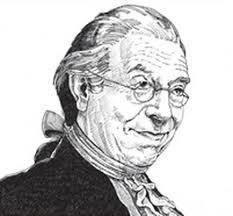Back in November I wrote a piece that dealt very dismissively with the Collins Red Lion series of phonics readers for children.
I started the piece by quoting Johnson’s opinion that children would far prefer grand stories that ‘stretch their tiny minds’ and simply ‘don’t want to hear about babies.’ This was largely an opinion drawn from his own childhood, where he could browse the shelves of his father’s bookshop at leisure and took particular pleasure in courtly tales of knights and dragons - a taste he never fully grew out of.
The 5 and 6 year olds at school are learning about the changes in toys and children’s entertainment over time and tomorrow they are looking at books. From the school collection, we have collected examples of books throughout the 20th and 21st centuries, from Beatrix Potter to Oliver Jeffers. I’m bringing along a sample of much earlier children’s books, including a facsimile of A Little Pretty Pocket Book, published by John Newbery in 1744. Next week I plan to talk about that book and report the modern children’s reactions to it.
This week, I want to talk a little about John Newbery himself. He’s an interesting figure, living in the house next to Canonbury Tower, where he’d keep writers and look after their money. Both Christopher Smart (son-in-law to his stepdaughter) and Oliver Goldsmith looked back on their time at Canonbury fondly. Smart remembers the happy domestic times with his wife in Jubilate Agno, even as his relationship to her grew more bitter. Goldsmith reflects on the absurdity of him walking around the grounds with a grim face, trying to think of lines that’ll make other people laugh.
Newbery is presented as ‘a friend to the author’ in Goldsmith’s Vicar of Wakefield, yet some biographies of Smart present him as a devious man, wishing to convince the world that Smart was mad and lock him up to make his own life easier. As well as a busy publishing career,
Newbery also sold over 30 patent medicines in his bookshop, the most famous being the fever powders of Dr James. Indeed, it was Newbery’s smart idea to package them in dosage size packets for convenient sale. Both Smart and Goldsmith were keen endorses of the powders, though they probably killed Goldsmith.
On the 19th August 1758, Samuel Johnson used Newbery as the basis of one of Idler number 19. The Idlers were actually printed by Newbery, so Johnson had plenty of opportunity to see him in action. It’s not the most flattering depiction of his publisher, “business keeps him in perpetual motion, and whose motion always eludes his business.” He never gets anything done, because he’s always so busy doing things.
“Jack’s trade is extensive, and he has many dealers; his conversation is sprightly, and he has many companions; his disposition is kind, and he has many friends.” Anyone who looks for him at home is told he’s at a club, anyone who looks for him at a club is told he is at home. He’s so busy being everywhere, that he ends up being nowhere, he’s so busy doing everything that he ends up doing nothing.
He’s great company and always a pleasure to be with but he’s always so busy going to the next place that no-one actually gets a chance to enjoy his company. “He seldom appears to have come for any other reason, but to say, He must go.” This is such an early edition of his essay series, I can imagine Johnson knocking it off with amusement and irritation after one of his visits.
I picture Newbery knocking quickly on the door of Gough Square, bursting in as soon as it is opened in a twirl of coat, heading towards the parlour, gabbling what he came to say and then going back through the open door to Johnson’s amusement and little Frank’s astonishment.
He is described as eating much the same way, sitting down to many meals and only taking a bite before whirling off to another meal and taking a bite of that. He treats ideas and projects similarly, pelting around the city and taking enthusiastic interest in one project, doing a little bit of it before being attracted to another.. never finishing any of them.
His biggest complaints are the lack of time and tiredness. I’ve met many people like him, feeling constantly fatigued and busy, without much to show for it. Teachers often fall into this type, but I’ve met office workers, clergy and a whole heap of other people like it also.
It doesn’t seem that Newbery calmed down very much, he died aged 55, all whirled out. Johnson was wrong about what he achieved though. Having risen from farmer’s son, to regional newspaperman to a solid London concern. He also brought works of Smart, Goldsmith and Johnson into the world, as well as creating some of the first works specifically written for children. As a result, he is remembered in the Newbery Medal, one of children’s literatures most prestigious awards. So he didn’t achieve nothing exactly.



No comments:
Post a Comment